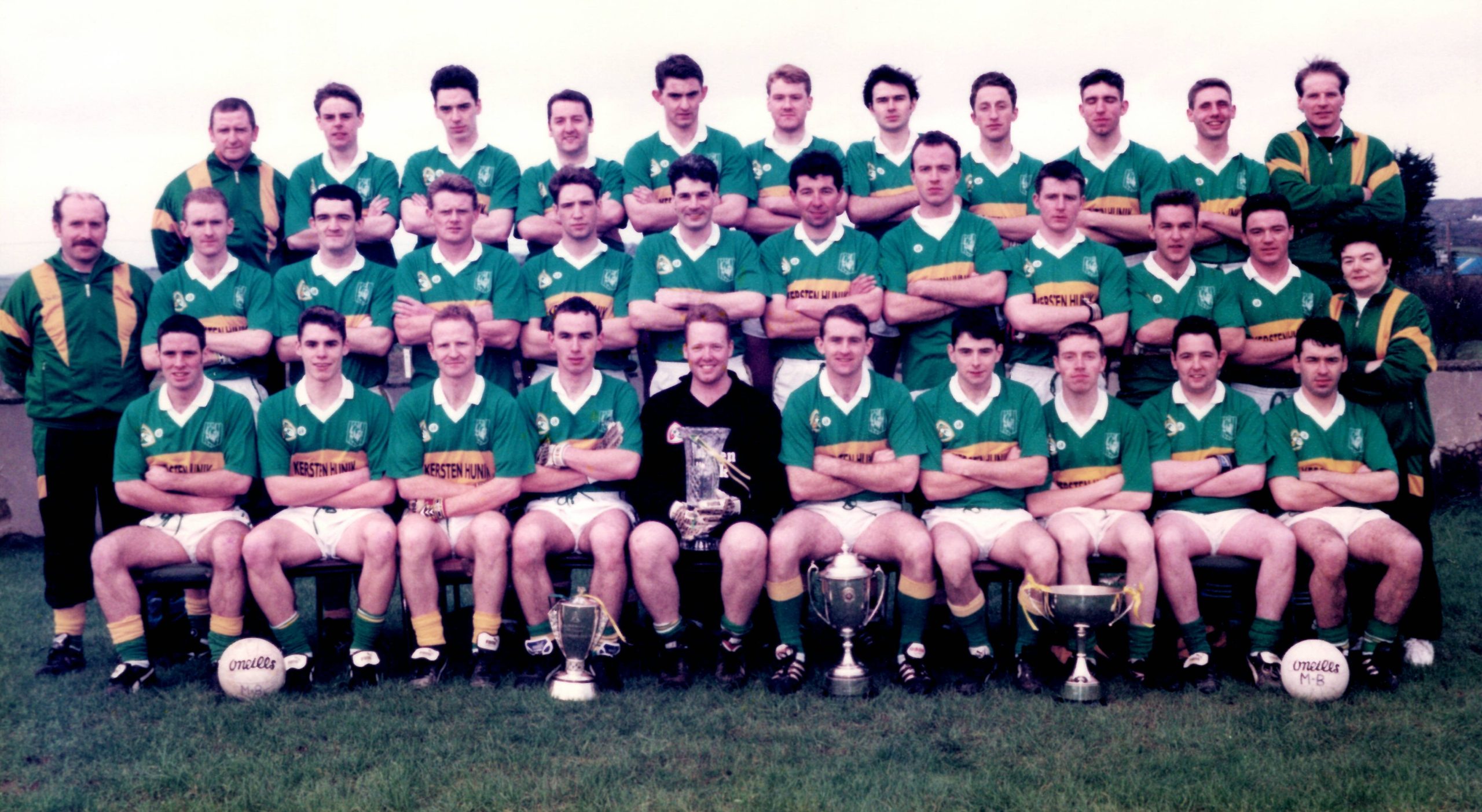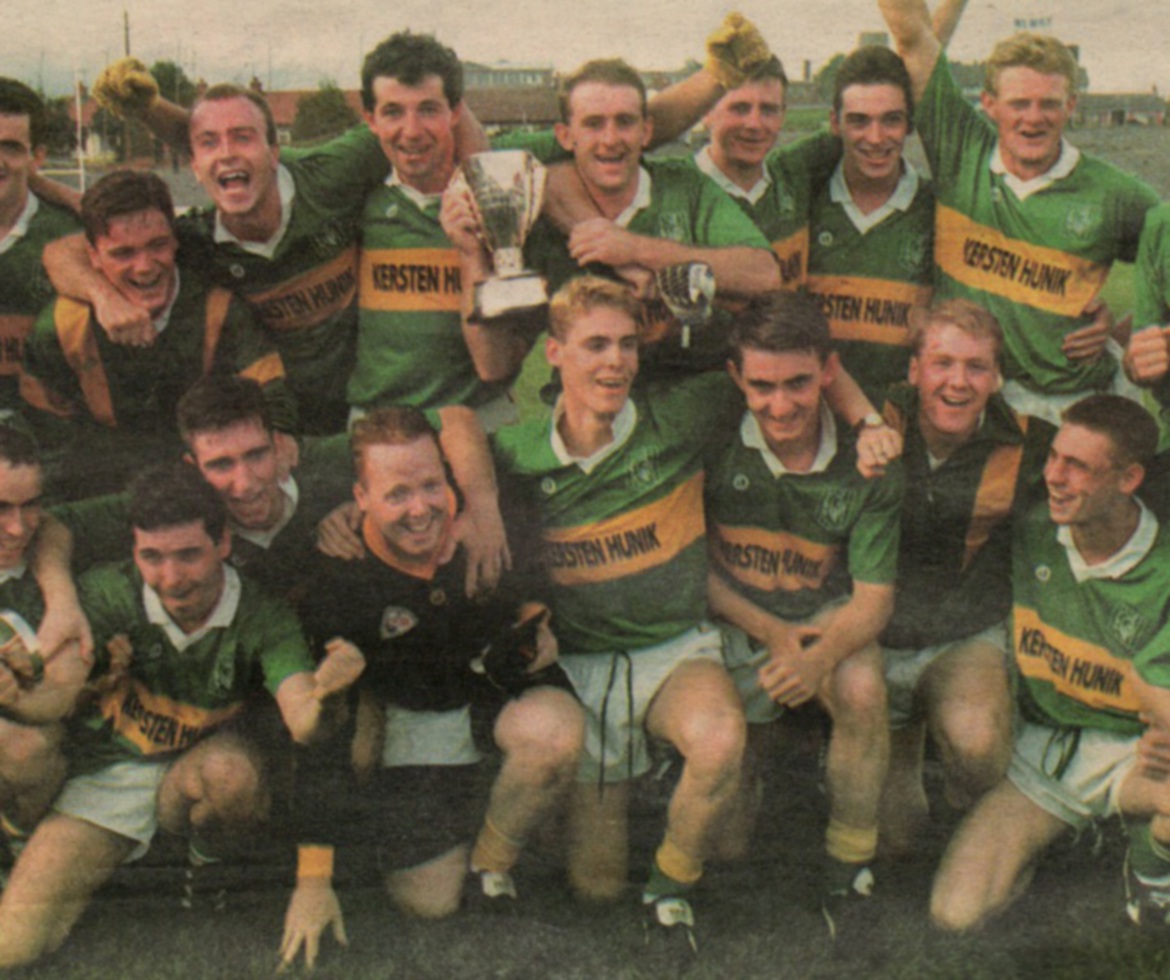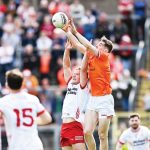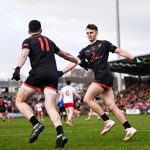Mullaghbawn will hold a reunion of their 1995 Armagh and Ulster winning team later this year. For manager Peter McDonnell, it was a victory years in the making. He spoke with Michael McMullan…
GROWING UP, Peter McDonnell never understood why his parents said “time flies” in relation to events in the past. Now, 30 years after steering Mullaghbawn to their greatest hour, he can relate to it
As principal in the local primary school, he has taught kids of the players he managed. It has kept 1995 front and centre. Later this year, the club will mark their glory year.
Over an hour spent in his company and you get a feel for their journey. Every word helps paint the picture. And it’s how he talks. You sense why the group followed.
“It wasn’t the culmination of a year’s training, it wasn’t the culmination of a year’s coaching,” McDonnell said of their successful season before hitting the rewind button.
There was a sole senior title in 1964. After that, two intermediate finals ended in defeat before the landscape began to change.
Before it did, there was a drop to Division Four but Mullaghbawn found hope in getting to the semi-final of a special 1984 competition to mark the GAA’s centenary.
Open to every club in the county, victory over Division Two Culloville was followed by a quarter-final in over Wolfe Tones who were in the top flight. McDonnell can still see a young Nial Smyth kicking a late 45 to win it.
“We rubbed shoulders with the higher grade of teams within the county and weren’t found wanting until we lost to Maghery in the semi-final,” he said, referring to the psychology of progress.
There was belief yet still a long way to go. Two years later, Mullaghbawn won both the junior and minor championships as they pushed back into the intermediate ranks.
Joe McNulty and Charlie Grant had been working with the underage. Eamon Murphy and Joe Daly got Sunday morning coaching up the running. It was a hive of activity. Kids came from all over the parish and reached for crisps and minerals afterwards.
Fr Gerard McAleer, who later was one of Mickey Harte’s trusted right-hand men, was curate in the parish and got involved too. The basics were so important.
It was an era of 14-year-olds cutting their teeth in the senior team. After losing the 1988 and ’89 finals, Mullaghbawn eventually ended their intermediate drought in ’92. They were now in with the big boys.
*****
Clan na Gael knocked Mullaghbawn out in the 1993 senior semi-final before going on to collect the title.
In the off season, McDonnell had little interest in hanging up his boots but reluctantly listened when a delegation of committee members and players coerced him to come on board as player manager.
Having managed the u-21s, alongside Smyth and Colin McParland, to two wins out of three county finals, it was viewed as the natural progression.
“They retired me,” McDonnell laughed. Doubling playing and managing was never going to work.
There were too many irons in the fire already. Recently married, a house was on the horizon. He was club secretary, working two nights a week in the club bar and looking after kids preparing for the transfer test at school.
“I had to be single-minded,” McDonnell said of Mullaghbawn’s championship aspirations. It had to be 100 per cent on one, playing or managing.
He chose the latter and poured his entire self into it. Before he did, it was time for another look to the past.
Finals meant hope followed by disappointment followed by a search for an excuse. Yes, there was sweat and toil but why didn’t they win? It was training. A manager. A coach.
“Basically, it all amounted to a pile of nothing, because we hadn’t got over the hurdle,” McDonnell said.
It was time to start looking inside the circle. In came his athletics background and a regime of tough training. There was talent there but it was time to step up to the plate.
When the management met initially, McDonnell said his aspiration was to win an Ulster title. A bold statement but the quality was there.
On the outside, it was feet on the ground time. Sleeves up, keep things simple and work harder than everyone else.
They’d learned their lessons of previous final shortcomings. Bunting and flags were a distraction.
McDonnell remembers the week before the 1989 intermediate final defeat to Dromintee.
As captain, he could sense a giddiness. Pulling the squad into a huddle, he went around everyone. How would they perform? How much would they score?
“Before I got to half a dozen players, we must have scored maybe 4-30,” he recalls.
“I was absolutely incensed that people’s heads were so far removed from what it was that they had to deal with.”
Now, as manager, it was about stripping everything back to brass tacks.
Thankfully, he knew what was under the hood, having taken a core of them to three u-21 finals. He knew them and vice versa. There was always going to be buy in.
Another factor was an increase in the number at college in Belfast, mixing with the best players from across Ulster.
“I would have driven the club minibus down to Queen’s, collected lads and took them back up to Mullaghbawn and trained them,” he said.
Along with some of the senior players, he chipped in to get a feed into the students’ bellies before ferrying them back to college life.
It was about training and preparation. But it was about more. Respect. Competing with county and college football.
“They got on that bus because it was so important, that Mullaghbawn was the most desirable football place those players could go to,” he said.
On the training pitch, it was about honesty. Owning their own levels of work.
It took them to the ’94 final but Clan na Gael came through. It was one they left behind.
It didn’t deter them and a look back at the video before the sides locked horns in the first round the following year shocked them.
“I remember one player standing up and said ‘for frig’s sake, how did we let that happen’, missed 20-metre frees and all of that,” McDonnell said.
His eyes dance as he recalls their preparations. Hard work but basic. They needed to control their own game.
Every six weeks, they’d have a team day out. They’d be told to bring their gear and a few bob in their pocket. There would be a few pints and a sing-song on the bus.
It all fed into the environment of being a team everybody wanted to play for. Buy in was inevitable.
The players were forbidden from going to watch other teams. McDonnell didn’t need 30 different opinions on opposing teams at meetings. The group came to trust the consistent message.
McDonnell always had every base covered, even commissioning a local wedding cameraman to rock up and record games across Armagh.
Oppositions would even move aside along the sidelines for him. Had he enough room? Was he alright? Was there anything that could get him?
Footage was edited and any player handed a key marking job knew exactly what was coming down the tracks.
On the training field, there was no end to kicking. It was until perfection. One night, 20 minutes into a kicking drill, Kieran McGeeney demanded more.
“We kick-passed in a very simple star thing for 40 minutes until we didn’t have drops,” McDonnell recalls. “That’s the level of intensity we had.”
Mullaghbawn parish backed into the steep side of Slieve Gullion, a fitness barometer.
McDonnell’s rucksack was filled with towels; toilet roll and toiletries. Others filled with bottles of water.
“We used every resource we had because people had lost control of both ends of their bodies at times going up that mountain,” he added.
The path to the top comprised of 38 separate runs. They’d only make it halfway at first, but kept returning. By their last visit, they made it to the top. From the summit, Wicklow was in view. They would look across into Cavan and Monaghan, to the Sperrins and into Belfast. Being at the top was symbolic of their squad.
Who could beat them? Benny Tierney was one of the best ‘keepers in the country. Smyth was a Rolls Royce, one everyone looked up to. There was a young McGeeney. Add in the McNultys.
“We had another gentleman called Patrick McGeeney that would go through a wall,” McDonnell added.
“We had other fellas there. Colin McPartland and our full-back ‘Cody’ (Colm) Byrne. I could go through all of those lads.”
There was county experience of some level littered across the team. And, from attending various Ulster Club games, McDonnell didn’t see much different from what Mullaghbawn had.
He classes them as the easiest group he has managed. Quite the statement but he meant it.
There was buy in and quality. They’d the players to blot out key opponents. And hungry for success. The perfect mix.
*****
The prize for beating Clan na Gael in the first game of the ’95 championship was a derby clash with a young Crossmaglen side who had yet to take Armagh, Ulster and Ireland by storm.
It was game made famous by the television documentary ‘More than a Game.’
The Armagh County Board were asked if there was an encounter that told a story of rivalry. It was a perfect pick.
“We thought to ourselves, well, if Crossmaglen have agreed to this, then we’ll agree to it,” McDonnell pointed out.
“We’ll not be seen to be afraid of whatever challenge lays in front of us.”
Mullaghbawn prevailed in the game. It was a victory but, despite the glare of television, for McDonnell, it was just another game.
However, it took a Patrick McGeeney goal to stop St Peter’s from pulling off a semi-final shock.
The outside noise of beating both Cross and Clan na Gael entitling them to put one hand on the cup had seeped in.
“By God, did that not give us plenty of ammunition to hit players with in the changing room and on the training field about letting other voices into their head,” McDonnell said. Distractions were the enemy.
A final with Armagh Harps sharpened the focus. Traditionally, Mullaghbawn struggled to take points of the city clubs. Harps were a serious team and went into the game as favourites.
The scoring averages were in Mullaghbawn’s favour and Tierney had yet to concede a championship goal that year.
The match programme, aside from the Mullaghbawn team and pen pics, was a shrine to the Harps. Another nugget to help McDonnell sharpen his side’s focus. Us against the rest.
Their plan was to keep the kick-outs away from the Grimley giants at midfield but the game still hung in the balance.
The tide changed midway through the second half when Tierney began to pepper his kicks to Shane Collins and Smyth in the middle. Into the lions’ den.
“It was when we stopped avoiding what we were afraid of that we started producing,” McDonnell said of the final piece of the winning puzzle.
The final whistle was bliss. Celebration and tears of joy. Despite being underdogs in most the games, they were county champions.
It was a surprise to many. McDonnell remembers a conversation with Castleblayney manager Eamon McEneaney later in the year. He had been told by some Gaels in Armagh that Mullaghbawn were only an intermediate team.
*****
When the celebration speeches finished in the Carrickdale Hotel, McDonnell arranged for Noel McParland to book a quiet room. For the players and management on their own. No hangers on.
All the talk on the way home from the game was about the Monday club at Larkin’s in Forkhill at 11 o’clock the next morning. Pints and craic.
McDonnell called for order. He wanted them to enjoy themselves. But, was this it? Was a county medal the pinnacle or did they want more?
He told them what he knew. There was an Ulster title to be won. The shackles were off. They’d be underdogs but a glance around the room reminded them they’d as much under bonnet as anybody else.
“We will do Larkin’s tomorrow,” McDonnell told them, “but I would ask you to wait for me and I’m not available till about seven o’clock.”
There it was. Eight hours less drinking. Everyone agreed. There was a big picture, but they still had a ball that night. Give and take.
The Tuesday night session blew out the rest of the cobwebs ahead of the Cargin game.
Conceding their first two goals of the season, they needed a scramble to book a semi-final spot with Castleblayney.
A conversation with Castlewellan manager Barney McAleenan gave McDonnell an insight to the Farney champions. It was the same as every other game. Preparation was everything. Every team got the same level of respect.
The video work gave Sean McDonnell the knowledge to nullify Peter Duffy. Smyth won the battle with Declan Loughman.
With Colin McParland playing as sweeper, ‘Nudie’ Hughes and the ‘Blayney attacking threat was lessened. If they were following runners, McParland’s positioning was perfect with ‘Cody’ Byrne in the pocket behind. Door closed.
Going into the final, Mullaghbawn had everything planned to a tee. They’d timed the various routes to Clones before deciding the Ballybay route was quickest.
As they walked back in after the warm-up, to get their jerseys on, they noticed the Bailieborough bus just arriving. Presumably late.
Mullaghbawn had the luxury of seeing the Cavan champions up close after they took two attempts to overcome a fancied Ballinderry.
“The match started and we were like a whirlwind and we just totally overran them,” McDonnell said.
Mullaghbawn failed to take the chances that could’ve cemented victory with Bailieborough then finding their feet with a comeback.

BAND OF BROTHERS;;;Mullaghbawn’s Armagh and Ulster winning squad of 1995
In a controversial finish, Mullaghbawn survived when referee Pat McEneaney blew his final whistle just before Bailieborough found the net with their last throw of the dice.
“We got across the line in a guttery Clones, on a wet December day,” McDonnell said.
As part of his speech, winning captain Fergal McDonnell mentioned how reporters were phoning during the week. Where are you located? Where is Mullaghbawn?
“He said ‘I’m lifting the cup, you know where Mullaghbawn is now,’” McDonnell recalls.
“People didn’t know whether to jump up or to fall down or to walk away. It was such an intrusion into the lives of people in our community that they had never really expected.”
They’d exceeded the expectations of many outside the team bubble. The clubhouse was packed that night from revellers from all over Armagh and beyond.
After beating London champions Tara, their All-Ireland dreams ended at the hands of Carlow side Éire Óg on a day dictated by wind and rain.
“We got to play with it in the second half, it was a lot less of an advantage than what Éire Óg had in the first,” he said.
“It was a huge regret and to see Éire Og beaten in the All-Ireland final by Laune Rangers made it even more disappointing.
“The journey wasn’t from the first round of the senior championship. The journey began in the first round of the junior championship. It started in division four.”
Thirty years in the blink of an eye. Time flies.
The full interview with Peter McDonnell will be available in the coming weeks as part of our Gaelic Lives podcast, available on YouTube and Spotify.
Receive quality journalism wherever you are, on any device. Keep up to date from the comfort of your own home with a digital subscription.
Any time | Any place | Anywhere















